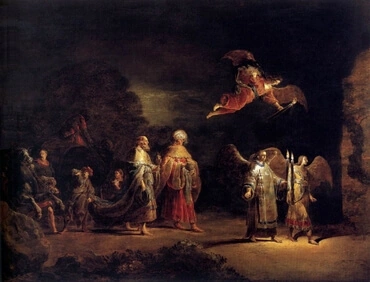Go

In the physical world, the places we inhabit and the distances between them are physical realities, and we have to get our physical bodies through the physical space between to get from one physical place to another physical place. In the spiritual world, however, the "places" we inhabit and the “distances” between them are spiritual realities, which means they are reflections of our thoughts and affections. "Going" from one place to another, then, is a change in spiritual state -- exploring different thoughts and embracing different feelings. Since the Bible is a spiritual book, "going" there also indicates a change or progression in spiritual state, from one mode of thinking and feeling to another mode of thinking and feeling. Obviously, this makes the precise meaning of "go" in the Bible highly dependent on context: Who is going? Where are they going? Why are they going there? Are they following someone or something? Those questions are crucial to the precise meaning. Used on its own, though, "going" represents the normal progression of life, moving through spiritual states as the Lord intends. This has its roots in early Biblical times, when people were nomadic and moved from place to place in a regular progression of life.
Jacob or Israel (the man)
Jacob is told twice that his name will now be Israel. The first time is when he wrestles with an angel on his journey to meet Esau, and the angel tells him that his name will be changed. After he is reconciled with Esau, they go their separate ways. Jacob moves to Shechem and then on to Bethel, where he builds an altar to the Lord. The Lord appears to him there, renews the covenant He first made with Abraham and again tells him that his name will be Israel (Genesis 35). The story goes on to tell of Benjamin's birth and Rachel's death in bearing him, and then of Jacob's return to Isaac and Isaac's death and burial. But at that point the main thread of the story leaves Israel and turns to Joseph, and Israel is hardly mentioned until after Joseph has risen to power in Egypt, has revealed himself to his brothers and tells them to bring all of their father's household down to Egypt. There, before Israel dies, he blesses Joseph's sons, plus all his own sons. After his death he is returned to the land of Canaan for burial in Abraham's tomb. In the story of Jacob and Esau, Jacob represents truth, and Esau good. Jacob's stay in Padan-Aram, and the wealth he acquired there, represent learning the truths of scripture, just as we learn when we read the Ten Commandments or the Sermon on the Mount. The change of name from Jacob to Israel represents the realization that what we learn should not simply be knowledge, but should be the rules of our life, to be followed by action. This action is the good that Esau has represented in the story up to that time, but after the reconciliation between Jacob and Esau, Jacob as Israel now represents the truth and the good, together. It is interesting that even after his name change Jacob is rarely called Israel. Sometimes he is called one and sometimes the other, and sometimes he is called both Jacob and Israel in the same verse (Genesis 46:2, 5, & 8 also Psalm 14:7). This is because Jacob represents the external person and Israel the internal person, and even after the internal person comes into being, we spend much of our lives living on the external level.
(Odkazy: Arcana Coelestia 4274, 4292, 4570, 5595, 6225, 6256, Genesis 2:5, 46:8)






